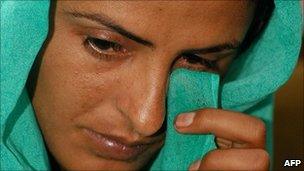Profile: Mukhtar Mai
- Published

Mukhtar Mai still lives in her village, and runs a school for girls
Mukhtar Mai was brutally gang-raped on the orders of her village council, because of an offence her 12-year-old brother was alleged to have committed.
He was deemed to have offended the honour of the powerful Mastoi clan by allegedly having an affair with a clanswoman. He was seen in her company and that incensed tribal leaders.
Ms Mai was 33 years old at the time and everybody expected her to commit suicide, as is often the case after rape in Pakistan. In the small southern Punjab village of Meerwala in Pakistan, where she lived, that was certainly the expectation.
But Mukhtar Mai refused and began what became a three-year legal battle against the men she said raped her and in doing so captured the imagination of millions around the world.
She accused 14 men of being involved in raping her. In 2002 a court sentenced six to death and acquitted the others citing a lack of evidence.
In an appeal, the Lahore High Court then overturned five of the six convictions. She appealed to the Supreme Court in 2005, but on Thursday the court rejected her appeal.
Poise and character
Despite fearing for her own life now, she has said she will not leave her home.
In the years since her initial appeal, Mukhtar Mai has set up schools for girls in her village with compensation money she received for her ordeal and became a global campaigner for women's rights.
She also set up a women's welfare organisation, a resource centre and a shelter for battered women. Over the years she has won numerous human rights accolades.
In 2007 she won the North-South Prize from the Council of Europe. She has been named Glamour Woman of the Year by Glamour magazine. Her autobiography became a best-seller in France.
But Ms Mai was born into a very poor clan - most members of her community work as tenant farmers. Pictures of her depict an apparently vulnerable, fragile woman. But all who have met her testify to her strength and resolve.
The BBC's Syed Shoaib Hasan, who has met Ms Mai, said she is a tall woman who looks you straight in the eye.
Our correspondent said he was struck by her poise and character. She weighs her words carefully and speaks clearly and directly.
Although her family were repeatedly threatened throughout the process, she said she would not back down.
'No faith'
But, on hearing of the acquittals, and for the first time since her rape, her words appeared devoid of hope.
"I have put my faith in God's judgement now. I don't know what the legal procedure is, but my faith [in the system] is gone," she said.
She is a married woman now. She got married in 2009 to a police constable from Punjab. She was taken on as a second wife and both women were reportedly happy with the arrangement.
A lot of ordinary Pakistanis respect her and she is very popular countrywide. But there are also critics of her among the powerful clans in the region and influential landlords.
Politicians, such as the Pakistan's People Party representative Jamshed Dasti, said the case was not all it was made out to be in 2008.
Her strong character has also made her vulnerable to criticism in a culture which, correspondents say, widely expect women to appear coy and demure.